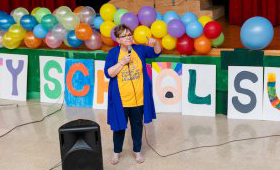New York - Janelle Adams, 17, of The Children’s Aid Society’s Hope Leadership Academy Boys & Girls Club, has been awarded a $2,000 college scholarship from Charles Schwab Foundation.
 Ms. Adams was selected because of her successful completion of the Money Matters: Make it Count program and the ways she is incorporating what she learned into her daily life and applying it to achieve short- and long-term goals.
Ms. Adams was selected because of her successful completion of the Money Matters: Make it Count program and the ways she is incorporating what she learned into her daily life and applying it to achieve short- and long-term goals.
Money Matters was created by Boys & Girls Clubs of America (BGCA) and Charles Schwab Foundation to promote financial literacy among teens from underserved communities.
“In a world becoming more financially complex, education about money management is vital to our nation’s future,” said Carrie Schwab Pomerantz, president of Charles Schwab Foundation. “Too many young people entering the workforce today don’t have an adequate grasp of the most basic building blocks of personal finance to become financially independent, successful adults.”
A recent survey* of teens conducted by Charles Schwab Foundation and BGCA reveals that while teens clearly know how to spend money, they have an uncertain grasp of the implications of their spending habits:
- Only about a third (34 percent) know how to balance a checkbook
- Fewer than half (41 percent) know how to budget money
- More than a quarter (29 percent) have accumulated debt, owing money to a person or company
- Of those teens who owe money, 41 percent are concerned about paying it back
“Through the Money Matters program and these scholarships, we are aiming to help today’s teens become financially fit adults who can help reverse the course of poor saving and debt management habits in the United States,” said Schwab Pomerantz. “In fact, we’ve already seen that the program is working; teens who experience Money Matters demonstrate increased awareness and understanding of the importance of making good financial choices.”
Ms. Adams, who is one of 10 teens to receive this scholarship from Charles Schwab Foundation, says “Money Matters taught me how to handle the money I have, and how to plan for the future.”
“Since implementing the Money Matters program, our Club members are becoming skilled in a number of areas including creating a budget, using a checking account, saving for college and the basics of managing debt,” said William Weisberg, Associate Executive Director of The Children’s Aid Society. “We are pleased they are learning how to handle their money responsibly and to see that this program can positively change financial knowledge and behavior.”
The Money Matters program is available to all teen Clubs and helps members learn the basics of money management, including budgeting, wise use of credit, saving, and investing. Resources include a Teen Personal Finance Guide and the Money Matters Web site - a secure site for teens. Money Matters also features the Schwab Employee Volunteer Program, which encourages Schwab employees to share their financial expertise with teen Club members and their families.
To date, approximately 884 Boys & Girls Club locations nationwide have adopted Money Matters, and nearly 70,000 teens have completed the program.
About The Children’s Aid Society
The Children’s Aid Society was founded in 1853. It is one of the nation’s largest and most innovative non-sectarian agencies, serving more than 150,000 of New York’s neediest children and their families with a network of services that includes community schools, neighborhood centers, camps, adoption and foster care services, teen pregnancy prevention, education, health and recreation. For more information, please call 212-949-4938 or visit www.childrensaidsociety.org.
About Boys & Girls Clubs of America
Boys & Girls Clubs of America (http://bgca.org) comprises a national network of some 4,000 neighborhood-based facilities annually serving more than 4.6 million young people, in all 50 states and on U.S. military bases worldwide. Known as “The Positive Place for Kids,” the Clubs provide guidance-oriented character development programs on a daily basis for children 6-18 years old, conducted by a full-time professional staff. Key Boys & Girls Club programs emphasize leadership development, education and career exploration, financial literacy, health and life skills, the arts, sports, fitness and recreation, and family outreach. National headquarters are located in Atlanta.
About Charles Schwab
The Charles Schwab Corporation (Nasdaq: SCHW) is a leading provider of financial services, with more than 300 offices and 6.9 million client brokerage accounts, 1.1 million corporate retirement plan participants, 177,000 banking accounts, and $1.4 trillion in client assets. Through its operating subsidiaries, the company provides a full range of securities brokerage, banking, money management and financial advisory services to individual investors and independent investment advisors. Its broker-dealer subsidiary, Charles Schwab & Co., Inc. (member SIPC, http://www.sipc.org), and affiliates offer a complete range of investment services and products including an extensive selection of mutual funds; financial planning and investment advice; retirement plan and equity compensation plan services; referrals to independent fee-based investment advisors; and custodial, operational and trading support for independent, fee-based investment advisors through its Schwab Institutional division. The Charles Schwab Bank, N.A. (member FDIC) provides banking and mortgage services and products. CyberTrader_, Inc. (member SIPC, http://www.sipc.org) is an electronic trading technology and brokerage firm providing services to highly active, online traders. More information is available at www.schwab.com.
Funded by the Charles Schwab Corporation, Charles Schwab Foundation is committed to giving back to the community by supporting employee-selected causes and fostering financial literacy through funding, involvement and expertise.
# # #
* The 2007 Teens & Money survey was conducted by StrategyOne, an applied research consulting firm, on behalf of Schwab and Boys & Girls Clubs of America. The nationally-representative online survey polled 1,000 American teens between the ages of 13-18 to better understand their views, behavior and knowledge of spending, saving, borrowing, and earning money. The survey, which has a margin of error of plus or minus 3.1 at the 95 percent confidence level, was conducted using the field services of Harris Interactive.



